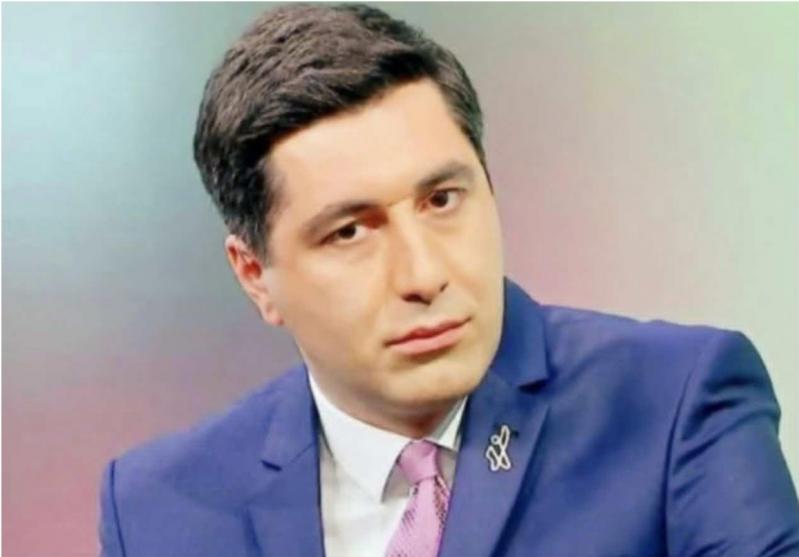Vakho Sanaia, a prominent Georgian journalist and television host for Formula TV, was arrested on Oct. 19 and sentenced the same day to six days of administrative detention for allegedly blocking a road during a protest on Rustaveli Avenue on Oct. 18. The Tbilisi City Court found Sanaia guilty of an administrative offense, drawing concern from his family, colleagues, and the public.
Sanaia was detained while taking a taxi with his 6-year-old daughter, forcing him to say goodbye in front of her before being taken into custody. At the time, his wife, Tamuna Kurashvili, was in Paris with their young son, Sani Sanaia, attending a routine endocrinologist check-up. A friend and journalist, Vika Bukia, called Tamuna to inform her of the arrest. Tamuna said she was shocked and struggled to breathe upon hearing the news. She added that little Sani remains unaware of his father's detention: "Thank God we are in Paris now, and my boy does not know. When we return to Georgia, Vakho will be out — I hope so."
Formula TV confirmed that Sanaia has been a fixture at the channel for five years, hosting the analytical news program "New Formula" five days a week alongside Nino Zhizhilashvili, as well as "Week Formula" on Sundays, featuring five political analysts. His absence has left a significant gap in Georgia's media landscape.
Sanaia was covering a protest near the Georgian Parliament, where thousands of demonstrators voiced their opposition to the pro-Russian government and the country's stalled Euro-Atlantic integration. Protesters criticized the government for following policies influenced by President Vladimir Putin of Russia and expressed frustration over corruption and electoral manipulation.
The Sanaia family has endured tragedy linked to Georgia's media environment. Vakho's older brother, Giorgi Sanaia, a journalist and anchor for Rustavi 2, was murdered on July 26, 2001, under circumstances widely believed to be connected to his investigative reporting on government corruption. Giorgi's death shocked the nation and deeply affected his family. Vakho Sanaia's mother, who survived this earlier tragedy, usually stays in the family home when Tamuna is abroad to ensure her son is not left alone.
Nino Zhizhilashvili condemned the growing pressure on Georgia's independent media, saying that Bidzina Ivanishvili, an oligarch, continues to harass media holdings financially and psychologically, creating an atmosphere of fear and intimidation.
"This is a time when journalists are being arrested simply for doing their jobs," she said. "It has been 10 months since my colleague, journalist Mzia Amaghlobeli, founder of Batumelebi magazine, was targeted — and now Vakho Sanaia has been arrested. For 10 years, Vakho and I worked side by side. He is a true fighter — deeply patriotic and professional in every sense. There is no peaceful work for journalists in Georgia today. Special Forces and police constantly harass reporters when they are out on the streets covering protests."
Zhizhilashvili added that she remains confident Sanaia will soon be released: "Vakho is very brave. He will continue to fight for his country, no matter the risks."
Vakho's mentor and friend, Zviad Koridze, highlighted the broader context of repression in Georgia: "Today, behind the bars of Ivanishvili's prisons sits Mzia Amaghlobeli — a journalist whose only 'crime' was raising her voice against human rights violations. When police tried to intimidate her, she did what any free spirit would do — she slapped the police chief. For that act, she was sentenced to two years in prison, where she endures harsh conditions for daring to be unafraid."
Koridze also referenced Zviad Ratiani, one of Georgia's greatest living poets, who faced two years in prison and a ban on writing materials after resisting the dictatorship through a bold poetic act. "And then there is Vakho Sanaia, a respected journalist documenting Georgia's social and political life for over 20 years. He went to Rustaveli Avenue to cover peaceful protests, and for simply being present, received six days of detention. Under the regime's new rules, any repeat participation in protests could lead to criminal prosecution," Koridze said.
"This is how dictatorship speaks to its people: Be silent, accept the loss of your rights, surrender to injustice. But dictatorships survive only when people give up. Georgia's prisoners of conscience, now numbering over 150, remind us what courage looks like. They keep society awake, refusing to let fear win. Mzia, Zviad, and Vakho are faces of resistance. Each carries the same message: Freedom is never surrendered — it is defended, even from behind bars."
As of this writing, as Vakho Sanaia serves his six-day detention in Mtskheta, near Tbilisi, questions remain about the future of journalism and freedom of speech in Georgia. His arrest, part of a wave of detentions of protesters and journalists, underscores tensions between authorities and the press, highlighting both the personal risks journalists face and the fragile state of press freedom.
Advocacy groups are calling for protections to ensure media professionals can work without fear, while the public watches closely as one of Georgia's most recognized journalists faces consequences for covering protests and defending democracy.
Tsisnami Sakvarlishvili lives in Amagansett.

